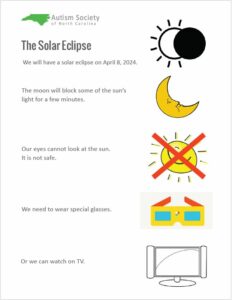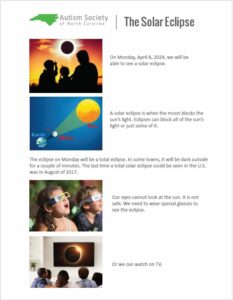The Autism Society of North Carolina would like to partner with you during the upcoming solar eclipse to keep your loved ones with autism safe at all times.
To help you prepare for the solar eclipse on Monday, April 8, we have created two social stories; click on the one that you think is most appropriate for your loved one to get a copy to download.
If you would like more information on safely viewing the eclipse, we recommend NASA’s website, which will show live video streams of the eclipse on Monday, April 8, 2024.
Saftey REMINDER
Except for the short period of a total solar eclipse when the Moon fully covers the Sun, it’s unsafe to gaze directly at the Sun without proper eye protection designed for solar viewing. Looking at any part of the Sun’s bright surface through a camera, binoculars, or telescope without a solar filter can cause immediate and severe eye damage.
During the partial phases of a solar eclipse, both before and after totality, it’s crucial to use safe solar viewing glasses or handheld solar viewers at all times. Alternatively, you can opt for indirect viewing methods like a pinhole projector.
Before using your eclipse glasses or handheld viewer, always check them for any signs of damage such as tears or scratches, and discard them if found. Ensure children are supervised when using solar viewers.
Never attempt to look at the Sun through a camera lens, telescope, binoculars, or any other optical device while wearing eclipse glasses or using a handheld solar viewer, as the concentrated solar rays can penetrate the filter and cause serious eye injury.
If you don’t have eclipse glasses or a handheld solar viewer, opt for indirect viewing methods like a pinhole projector, which projects an image of the Sun onto a nearby surface without direct viewing. Avoid looking through the pinhole directly at the Sun.
Do not use eclipse glasses or handheld viewers with cameras, binoculars, or telescopes, as these devices require different types of solar filters. Instead, use proper solar filters on cameras, binoculars, or telescopes to view the partial phases of the eclipse safely without the need for eclipse glasses.
For more safety information, please refer to the NASA Eclipse Safety Page.
Tags: ASNC, autism, autism asperger parenting tips, autism society north carolina, autism society of NC, Autism Society of North Carolina, Autism spectrum, Autism Spectrum Disorder, eclipse, eclipse autism, solar eclipse Go back


